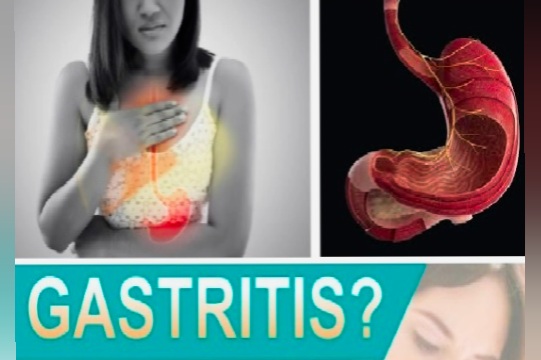-

Gastritis is inflammation of the gastric mucosa, which can be considered as acute or chronic. It is a very common disease and very commonly undertreated. Patients may complain of epigastric burning pain and occasionally vomiting. Usual symptoms include indigestion, nausea and occasionally vomiting. Gastric ulcers tend to cause pain that is worse during the day and after meals. Duodenal ulcers tend to cause well-localized epigastric pain that may radiate to the back. It occurs a few hours after meals or on an empty stomach and is often worse at night or in the early hours of the morning when circadian acid secretion is maximal.Endoscopy can be performed to confirm the diagnosis.
Major contributing factors include presence of H. pylori within the stomach, the use of nonsteroidal anti-inflammatory drugs (NSAIDs) and aspirin. Stress from medical issues or stress from social situations can also contribute. Rarely pathological hypersecretion of gastrin (Zollinger–Ellinson syndrome) may be the cause of multiple ulcers or peptic ulcer disease resistant to regular treatment.
Gastritis types
There are two main types of gastritis:
Erosive (reactive): Erosive gastritis causes both inflammation and erosion (wearing away) of the stomach lining. Reactive gastritis is another name for this condition. Alcohol, smoking, NSAIDs, corticosteroids, viral or bacterial infections, and stress from illnesses or injuries are all contributing factors.
Non-erosive: Inflammation of the stomach lining without erosion or compromising the stomach lining.
Gastritis causes
Common causes of gastritis include:
Helicobacter pylori (H. pylori): There is a bacteria called H. Pylori in the mucous lining of the stomach. H. pylori is present in the gastric mucosa of most human beings and it plays an important role in the natural stomach ecology. However, it can sometimes result in an infection and the development of chronic gastritis, as well as other complications such as gastric ulcers, gastric neoplasms, and stomach cancer in some people. Effective chronic gastritis treatment is crucial in managing this condition.
Pernicious anemia: A type of anemia that occurs when the stomach lacks a naturally occurring substance needed to properly absorb and digest vitamin B12. The loss of the ability to absorb vitamin B12 is the most common cause of adult vitamin B12 deficiency.
Bile reflux: Backflow of bile into the stomach from the bile tract. The bile tract connects the liver and the gallbladder. Bile is a yellowish fluid produced by the liver that aids in the digestion of lipids in the small intestine. Backflow of bile in the stomach can have adverse effects.
Use of NSAIDs: Nonsteroidal anti-inflammatory drugs are a drug class that groups together drugs that provide pain-killing and fever-reducing effects. Long term usage of NSAIDs causes gastric erosions, which can become stomach ulcers.
Common less common causes of gastroenteritis include irritation caused by excessive use of alcohol, smoking, severe illness, chronic vomiting, stress, and autoimmune problems, among others.
Gastritis symptoms
The general symptoms of gastritis are:
- Stomach pain or discomfort (from mild to severe aching, burning, or gnawing)
- Heartburn
- Loss of appetite.
- Nausea and vomiting
- Vomiting of blood
- Weight loss
- Fever
- Stomach feeling of unusual fullness.
- Feeling full too quickly after eatingGastritis treatment
A gastroenterologist treats gastritis on the basis of diagnosis reports and how severe the pain or disorder is. The general treatment provides medication to control or eliminate the symptoms.
- Antibiotic medications to kill H. pylori
- Acid-inhibiting drugs that help the body heal. Proton pump inhibitors work by blocking the actions of the parts of the cell that produce acid, preventing it from being produced.
- Acid-reducing medications
- Acid-neutralizing medicationsGastritis prevention (gastritis foods to avoid)
The following foods can irritate the stomach and aggravate gastritis:
- Acidic foods, such as tomatoes and some fruits, should be avoided.
- alcohol
- carbonated drinks
- coffee
- fatty foods
- fried foods
- fruit juices
- pickled foods
- spicy foods
- tea
Avoiding a specific food or food group that aggravates your symptoms can help you disengage from gastritis symptoms. This is especially true in the case of food allergies.Gastritis Diagnosis
Diagnostics for gastritis involve a complete review of your medical history and performing a thorough physical evaluation. The gastroenterologist will interview the patient about their symptoms, complete medical history, lifestyle and habits, and any medications they are taking. In many cases, this information is sufficient to make a diagnosis. It is sometimes advised to go for
Gastritis endoscopy: To determine the extent of inflammation and may perform biopsy.
Blood tests: Various blood tests may be needed, such as checking your red blood cell count to determine whether you have anemia, an H. pylori test to determine the presence of H. pylori bacteria, etc.
Stool test: This test checks for the presence of blood in your stool, a sign of gastritis. -
Surgery
There are two types of surgeries that are offered for patients suffering from chronic resistant gastritis or Recalcitrant gastritis .Complications like stricture and gastric outlet obstruction will also need correction and surgery . Broadly these surgeries based on the technique can be classified as OPEN SURGERY and MINIMALLY INVASIVE SURGERY.
OPEN SURGERY- Open Truncal or Selective Vagotomy and pyloroplasty
Open surgery involves open technique. Here an incision is made on the abdomen. The area of the stomach and pylorus area is evaluated. The area where the anterior and the posterior vagus is identified is near the GE junction and this is divided, this is called truncal vagotomy. Selective vagotomy is where the selectively nerve branches are divided near the lesser curve of the stomach near the pylorus. Pyloroplasty is performed. The surrounding structures are evaluated and the incision is closed.
Open surgery is usually more painful than the minimally invasive surgeries. But there are various medications that we use to help you have better pain control.
For this surgery you may need a complete blood count (CBC), chemistry profile, PT, PTT. Depending on your medical history, we may require additional testing: chest X-Ray, EKG, medical clearance from your primary care physician, cardiac clearance from your cardiologist, additional blood work and finally Anesthesiology clearance.
We recommend that you have your blood work done before having the surgery performed. If this is not possible, please notify the surgical scheduling team at 8884200030.
MINIMALLY INVASIVE SURGERY- Laparoscopic Truncal or Selective Vagotomy and pyloroplasty
Laparoscopic surgery involves minimally invasive technique. Here we make small 5 mm incisions on the side of the abdomen and small 10 mm incisions are also made. The abdomen is entered and the stomach area is evaluated. The area of the stomach and pylorus area is evaluated. The area where the anterior and the posterior vagus is identified is near the GE junction and this is divided, this is called truncal vagotomy. Selective vagotomy is where the selectively nerve branches are divided near the lesser curve of the stomach near the pylorus. Pyloroplasty is performed.
Laparoscopic surgeries are usually less painful than the open surgeries. We still give you pain medications and nerve blocks so that you feel comfortable and are able to walk about six hours after the surgery.
For this surgery you may need a complete blood count (CBC), chemistry profile, PT, PTT. Depending on your medical history, your physician may require additional testing: chest X-Ray, EKG, medical clearance from your primary care physician, cardiac clearance from your cardiologist, additional blood work and finally Anesthesiology clearance.
We recommend that you have your blood work done before having the surgery performed. If this is not possible, please notify the surgical scheduling team at 8884200030.
-
Patient education
BEFORE SURGERY
Please refer to the instructions below in preparation for your surgery. Proper preparation is essential to obtain the best surgical experience and results. Please note that failure to follow these instructions may result in rescheduling your surgery. Our team will contact each patient directly and will be available to answer any additional questions about surgery, scheduling and instructions.
PRE-OPERATIVE TESTING
You may need a complete blood count (CBC), chemistry profile, PT, PTT. Depending on your medical history, your physician may require additional testing: chest X-Ray, EKG, medical clearance from your primary care physician, cardiac clearance from your cardiologist, blood work and anesthesiology clearance.
We recommend that you have your blood work done at the hospital where you are having the surgery performed.Please download instructions below if you need any further instructions, please notify the surgical scheduling team at 8884200030.
-
why us?
Gastritis, like any other disease, necessitates prompt treatment because it can lead to ulcers and an increased risk of stomach cancer. If you are experiencing any of the symptoms of gastritis, contact MH Surgery. We have a team of highly qualified doctors and nurses who will provide you with the best possible care and support. Our advanced disease-curing techniques are extremely competent and effective. Make an appointment or come in to see a consultant for gastritis or any other condition.
Our minimally invasive Surgeons are well known internationally in their field. They are experts in the diagnosis and management of various conditions, and innovation of minimally invasive surgery techniques. Our best gastroenterologist surgeon in Bangalore provides a personalized approach for each patient, offering advanced surgical solutions. Our surgeons educate physicians on innovative techniques through national,international presentations and web-based seminars.

